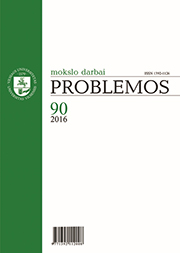HEIDEGGERIO TECHNIKOS SAMPRATOS UŽUOMAZGOS ANKSTYVOSIOSE SENOVĖS GRAIKŲ INTERPRETACIJOSE
THE BEGINNING OF HEIDEGGER’S CONCEPTION OF TECHNOLOGY IN HIS EARLY INTERPRETATIONS OF ANCIENT GREEKS
Author(s): Tomas Nemunas MickevičiusSubject(s): Metaphysics, Ancient Philosphy, Early Modern Philosophy, Existentialism, Philosophy of Science, Phenomenology, Hermeneutics
Published by: Vilniaus Universiteto Leidykla
Keywords: technology; machination; enframing; producing; being;
Summary/Abstract: In this article an attempt is made to explicate the influence that the early Heidegger’s interpretations of Ancient Greek philosophy had on his later conception of modern technology. It is shown, first, how the conception of Being as produced, which has arisen while searching for origins of Ancient Greek philosophy, reflects itself in the later thought on the modern technological opening of Being, named machination (Machenschaft) and, later, enframing (Gestell). Secondly, it is shown how one of the essential structural elements of productive behaviour (herstellende Verhalten) – namely the conception of causality – is important for the later explication of modern technological understanding of Being. And finally, it is shown how the early Aristotelian conception of tέχνη as a mode of truth (ἀλήθεια) or mode of being in truth (ἀληθεύειν) reflects itself in the innovative Heideggerian conception of technology as a mode of understanding of Being.
Journal: Problemos
- Issue Year: 2016
- Issue No: 90
- Page Range: 57-63
- Page Count: 7
- Language: Lithuanian

